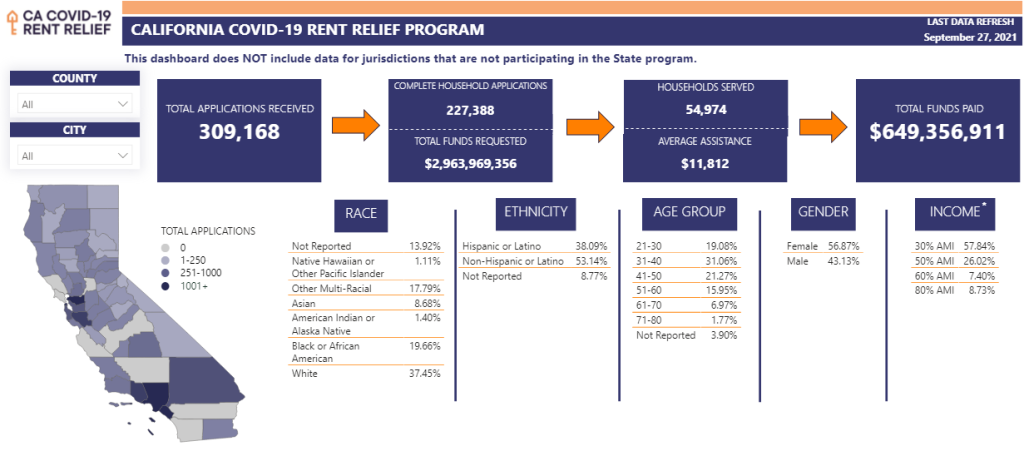Updates on Statewide Eviction Moratorium and Rental Assistance
On September 30, the statewide eviction moratorium under the COVID-19 Tenant Relief Act (CTRA) is due to end. However, the law will not simply return to its pre-pandemic form. Instead, a new law, the COVID-19 Rental Housing Recovery Act, (the “Recovery Act”), will take its place.
Click here to view the key differences in practices and procedures.
Over $4 billion dollars of rental assistance are still available to tenants and housing providers struggling with back rent. Learn more in the video and information below or apply for rental assistance at https://housing.ca.gov/.
Governor Newsom has signed Assembly Bill 832 (AB 832) into law, extending eviction protections through September 30, 2021, for tenants who have been unable to pay rent due to the COVID-19 pandemic.
AB 832 replaces the San José residential eviction moratorium.
Tenants cannot be evicted for pandemic-related rent debt (i.e., rent due between March 1, 2020 and September 30, 2021) so long as they:
Pay at least 25% of rent due by September 30, 2021, for the period of September 1, 2020 through September 30, 2021. Tenants may do this by paying at least 25% each month, or by paying a lump sum by September 30, 2021; and
Submit to their landlord a signed Declaration of COVID-19-related Financial Distress within 15 days of receiving a notice for nonpayment of rent.
AB 832 requires landlords to provide certain disclosures to their tenants when serving a tenant with a notice for nonpayment of rent. Landlords must also declare they have applied for rental assistance prior to commencing an eviction lawsuit, and the law provides that Courts can reinstate a tenancy if a tenant’s application for rental assistance is approved and they are awaiting payment.
AB 832 also states landlords and tenants have the option to litigate disputes regarding unpaid rent accumulated from March 1, 2020 to September 30, 2021 in small claims court beginning November 1, 2021.
The new law further allows tenants to access rental assistance directly from the State if their landlords choose not to participate and ensures landlords can receive compensation even if their income-qualified tenants have already vacated a unit. AB 832 ensures housing providers receive 100% of that back rent. Those housing providers who have already received 80% of back rent will receive the remaining 20% automatically.
Santa Clara County residents who earn less than 30% of the Area Median Income (AMI) can apply for rental assistance through the local program, known as the Santa Clara County Homelessness Prevention System – COVID-19 Response.
To be eligible, a tenant must:
Have been financially impacted by the pandemic. This could include losing a job, having work hours cut, owning or working for a business that closed temporarily or permanently, or being unable to work due to illness from COVID-19, caring for elders or children (including due to distance learning or loss of childcare), or having unexpected family expenses due to the pandemic.
Be at risk of losing housing. This could include receiving an eviction or late payment notice from a landlord, being behind on rent or utilities, or being unstably housed (including living in overcrowded housing); AND
Make less than 30% of AMI. In Santa Clara County, this would be an annual income before taxes of $49,700 for a household of four.
Renters with incomes between 30% and 80% of AMI are eligible for assistance through the State assistance program at HousingIsKey.com or by phone at 833-430-2122. Santa Clara County residents can get information about rental assistance resources, including which program they are eligible for, online at SCCRentHelp.org.

*Most recent income limits from the U.S. Department of Housing and Urban Development (HUD) as of April 1, 2021.
While C.A.R. recognizes that federal law restricts the state’s use of federal funds to assist only tenants who earn up to 80% of area median income, C.A.R. believes that, given the extended moratorium, housing providers who have tenants who earn above that federal cap who are experiencing pandemic related hardships and are unable to pay their rent should receive rental assistance. C.A.R. has expressed these concerns to the Legislature and is continuing to work to see if state funds can be allocated for such assistance.
Additional Resources:
- Rental Assistance Application
- C.A.R. Rent Relief Toolkit
- C.A.R. Legal Quick Guide Eviction Moratorium
- C.A.R. Legal Quick Guide Rental Assistance
- C.A.R. Webinar Recording Eviction Moratorium and Rental Assistance
- C.A.R. Webinar Slides
- FULL AB 832 Bill Text
- CA Rent Relief Call Center: 1-833-430-2122

